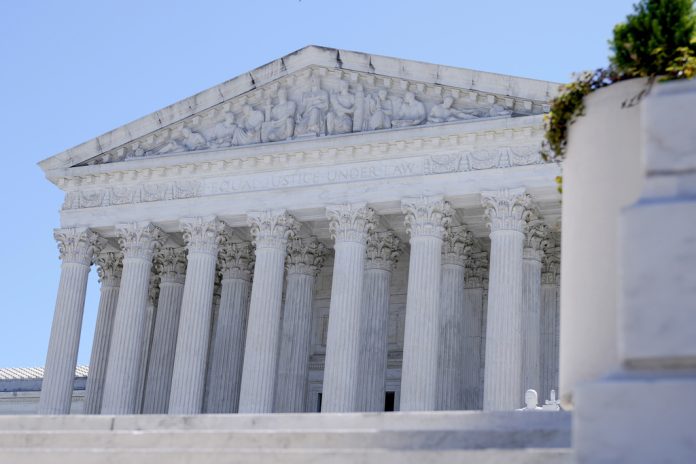WASHINGTON (AP) — The Supreme Court on Monday shut down a long-shot push from Missouri to remove a gag order in former President Donald Trump’s hush-money case and delay his sentencing in New York.
The Missouri attorney general went to the high court with the unusual request to sue New York after the justices granted Trump broad immunity from prosecution in a separate case filed in Washington.
The order states that Justices Clarence Thomas and Samuel Alito would have allowed Republican Andrew Bailey to file the suit, though not grant his push to quickly lift the gag order and delay sentencing.
Bailey argued the New York gag order, which Missouri wanted stayed until after the election, wrongly limits what the GOP presidential nominee can say on the campaign trail around the country, and Trump’s eventual sentence could affect his ability to travel.
“The actions by New York have created constitutional harms that threaten to infringe the rights of Missouri’s voters and electors,” he wrote.
Bailey railed against the charges as politically motivated as he framed the issue as a conflict between two states. While the Supreme Court typically hears appeals, it can act as a trial court in state conflicts. Those disputes, though, typically deal with shared borders or rivers that cross state lines.
New York, meanwhile, said the limited gag order does allow Trump to talk about the issues important to voters, and the sentence may not affect his movement at all. Democratic New York Attorney General Letitia James argued that appeals are moving through state courts and there’s no state-on-state conflict that would allow the Supreme Court to weigh in at this point.
“Allowing Missouri to file this suit for such relief against New York would permit an extraordinary and dangerous end-run around former President Trump’s ongoing state court proceedings,” she wrote.
Trump is under a gag order imposed at trial after prosecutors raised concerns about Trump’s habit of attacking people involved in his cases. It was modified after his conviction, though, to allow him to comment publicly about witnesses and jurors.
He remains barred from disclosing the identities or addresses of individual jurors, and from commenting about court staffers, the prosecution team and their families until he is sentenced.
His sentencing has been delayed until at least September.
Trump was convicted in Manhattan on 34 counts of falsifying business records arising from what prosecutors said was an attempt to cover up a hush money payment to porn actor Stormy Daniels just before the 2016 presidential election. She says she had a sexual encounter with Trump a decade earlier, which he denies.
The charge is punishable by up to four years behind bars, though it’s not clear whether prosecutors will seek prison time. Incarceration would be a rare punishment for a first-time offender convicted of Trump’s charges, legal experts have noted. Other potential sentences include probation, a fine or a conditional discharge requiring Trump to stay out of trouble to avoid additional punishment.
Trump is also trying to have the conviction overturned, pointing to the July Supreme Court ruling that gave him broad immunity from prosecution as a former president. That finding all but ended the possibility that he could face trial on election interference charges in Washington before the election.
The high court has rejected other similar suits framed as a conflict between states in recent years, including over the 2020 election results.
Source: post





